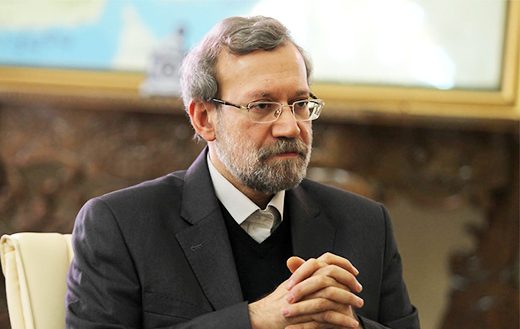Speaker of the Islamic Consultative Assembly Ali Larijani says that parliament took into account different aspects of the nuclear case when it reviewed the bill on the Joint Comprehensive Plan of Action (JCPOA).
Larijani made the remark in a gathering on the Promotion of Virtue and Prevention of Vice in Tehran on Sunday and added that he had no personal interest in the nuclear case and did what he did based on the responsibilities he had undertaken.
The Islamic Republic News Agency (IRNA) on Sunday covered the speaker’s remarks which mainly focused on the passage in parliament of JCPOA and the critical comments on its approval. After his speech a woman approached the top MP and criticized what she called the ceremonial passage of JCPOA in the chamber. The following is the translation of part of his remarks in response to that woman’s criticism:
[Addressing the woman] I appreciate your critical comment. This amounts to promotion of virtue and prevention of vice. But why did you use the word “ceremonial”? In promoting virtue, a soft tone should be adopted.
Nuclear talks lasted almost three years. One year during the previous government’s tenure and two years in the current government’s; Iran pursued the talks and moved forward with eyes wide open. The Supreme National Security Council and other councils were involved in the [process of concluding the] Iran nuclear deal and provided parliament with explanations. Finally we reached the final stage and an agreement was concluded which came with certain frameworks.
Some said that JCPOA is to the detriment of the country and should be shelved. In case of rejection, what would have been the consequences? Others said that it is a good document and should be fully implemented, but there was a third view in between suggesting that the document should be controlled within the framework of certain conditions. The last view sounded more sensible.
We did not want to disapprove JCPOA, nor did we want to implement a US version of the deal. That’s why debates got more heated in the Supreme National Security Council with some wondering what should be done and others insisting that we should reject JCPOA. But we said that it could be implemented with some strings attached.
In the end, the Supreme Leader asked for the review of JCPOA in an open parliament session. We did not want to limit a parliamentary decision to a report released by one of its committees. To that end, we tried to pass a law so that parliament does not have to play an inactive role.
[…]
Parliament debated the JCPOA implementation bill after listening to the JCPOA Review Committee’s report. The chamber voted for the bill’s general outlines after a four-hour-long debate. That day some came and asked for the rejection of JCPOA and others came and said that the bill on JCPOA should be shelved in parliament. You may not believe your ears if I reveal the names of these people. They were saying that parliament does not need to decide on the bill, but we said that we need to make a law because the Supreme Leader has stressed that JCPOA should be reviewed in parliament. […]
In light of a threat that the Western side wants to implement the Joint Comprehensive Plan of Action in a different fashion, we passed the JCPOA implementation bill to prevent it from happening. According to one article of the bill, JCPOA should be brought to a halt if sanctions are not terminated or the other side fails to remove them on any grounds.
[…]
